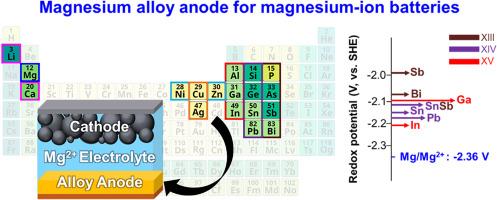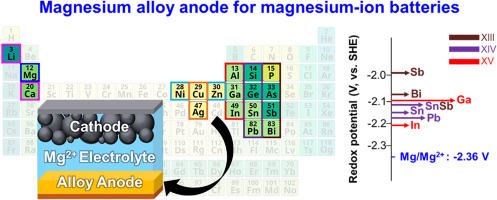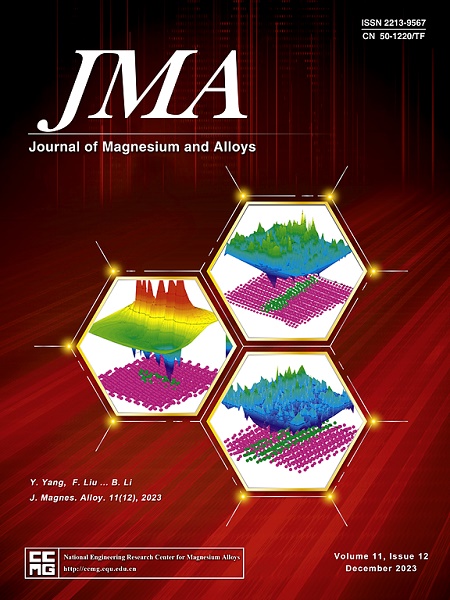Magnesium alloys as alternative anode materials for rechargeable magnesium-ion batteries: Review on the alloying phase and reaction mechanisms
IF 15.8
1区 材料科学
Q1 METALLURGY & METALLURGICAL ENGINEERING
引用次数: 0
Abstract
Magnesium-ion batteries (MIBs) are promising candidates for lithium-ion batteries because of their abundance, non-toxicity, and favorable electrochemical properties. This review explores the reaction mechanisms and electrochemical characteristics of Mg-alloy anode materials. While Mg metal anodes provide high volumetric capacity and dendrite-free electrodeposition, their practical application is hindered by challenges such as sluggish Mg²⁺ ion diffusion and electrolyte compatibility. Alloy-type anodes that incorporate groups XIII, XIV, and XV elements have the potential to overcome these limitations. We review various Mg alloys, emphasizing their alloying/dealloying reaction mechanisms, their theoretical capacities, and the practical aspects of MIBs. Furthermore, we discuss the influence of the electrolyte composition on the reversibility and efficiency of these alloy anodes. Emphasis is placed on overcoming current limitations through innovative materials and structural engineering. This review concludes with perspectives on future research directions aimed at enhancing the performance and commercial viability of Mg alloy anodes and contributing to the development of high-capacity, safe, and cost-effective energy storage systems.


镁合金作为可充电镁离子电池的替代阳极材料:合金相和反应机制综述
镁离子电池(MIBs)具有丰富的资源、无毒性和良好的电化学特性,是锂离子电池的理想候选材料。本综述探讨了镁合金负极材料的反应机理和电化学特性。虽然镁金属阳极具有高容积容量和无枝晶的电沉积特性,但其实际应用却受到 Mg²⁺ 离子扩散缓慢和电解质兼容性等挑战的阻碍。含有 XIII、XIV 和 XV 族元素的合金型阳极有可能克服这些限制。我们回顾了各种镁合金,强调了它们的合金化/合金化反应机制、理论容量以及 MIB 的实用性。此外,我们还讨论了电解质成分对这些合金阳极的可逆性和效率的影响。重点是通过创新材料和结构工程克服当前的局限性。本综述最后展望了未来的研究方向,旨在提高镁合金阳极的性能和商业可行性,为开发高容量、安全、经济高效的储能系统做出贡献。
本文章由计算机程序翻译,如有差异,请以英文原文为准。
求助全文
约1分钟内获得全文
求助全文
来源期刊

Journal of Magnesium and Alloys
Engineering-Mechanics of Materials
CiteScore
20.20
自引率
14.80%
发文量
52
审稿时长
59 days
期刊介绍:
The Journal of Magnesium and Alloys serves as a global platform for both theoretical and experimental studies in magnesium science and engineering. It welcomes submissions investigating various scientific and engineering factors impacting the metallurgy, processing, microstructure, properties, and applications of magnesium and alloys. The journal covers all aspects of magnesium and alloy research, including raw materials, alloy casting, extrusion and deformation, corrosion and surface treatment, joining and machining, simulation and modeling, microstructure evolution and mechanical properties, new alloy development, magnesium-based composites, bio-materials and energy materials, applications, and recycling.
 求助内容:
求助内容: 应助结果提醒方式:
应助结果提醒方式:


